クリスティアーン・ホイヘンス(1629年4月14日 – 1695年7月8日)
Christiaan Huygens (April 14, 1629 – July 8, 1695)
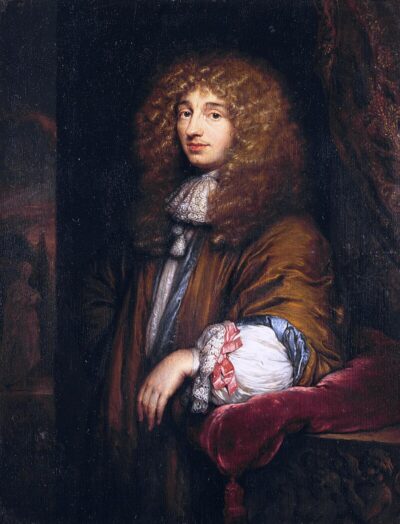
生い立ち・生涯
生い立ちと初期の影響
クリスティアーン・ホイヘンスは、17世紀のオランダで生まれた、多才な天文学者、数学者、そして哲学者である。
彼の生い立ちは、その後の彼の思想や業績に大きな影響を与えた。1629年、オランダのデルフトで生まれた彼は、幼少期から数学と天文学に興味を持ち、特に数学的な問題に対する才能が早くから現れた。
影響と交流
ホイヘンスの才能は、彼がトーナメントでライデン大学に入学した際にさらに開花した。
そこで彼は、レンズの研究など様々な科学的興味を深める中で、同時代の著名な科学者たちと交流を持つようになった。
特に、彼の友人や対話相手であるバーネット・ヴァン・デル・ポールとの関係は、彼の後の発展に大きな影響を与えた。
発見と業績
ホイヘンスの業績は多岐にわたるが、特に彼の天文学の貢献は顕著である。
彼は望遠鏡の改良によって、木星の衛星や土星の輪、そして月の地形を初めて観測し、これらの観測結果を記録している。
また、彼の業績は数学と物理学にも及び、彼の「光学」における波動説の提唱は、後の光の性質に関する理解に大きな影響を与えた。
政治と哲学
一方で、ホイヘンスは科学者としてだけでなく、政治的な活動家としても知られている。
彼はオランダの政治的諸問題に積極的に関与し、国内の平和と自由のために尽力した。
また、彼の哲学的な考え方も注目に値する。彼は合理主義と経験論の間でのバランスを探求し、現実と理論の統合を試みた。
最後の日々
ホイヘンスは1695年にデルフトで亡くなったが、彼の遺産はその後の科学と哲学に深い影響を与え続けた。
彼の業績は時代を超えて称賛され、彼の生涯は数多くの学者や研究者にとって、模範となるものとなっている。
Early Life and Legacy
Background and Early Influences
Christiaan Huygens was a versatile astronomer, mathematician, and philosopher born in 17th-century Netherlands. His early life profoundly influenced his later thoughts and achievements. Born in Delft in 1629, Huygens showed an early interest in mathematics and astronomy, displaying a natural talent for solving mathematical problems from a young age.
Influences and Connections
Huygens’ talents blossomed further when he entered Leiden University. There, he deepened his scientific interests, including lens research, and began interacting with prominent scientists of his time. His relationship with his friend and collaborator, Barnard Van der Poel, significantly influenced his later development.
Discoveries and Achievements
Huygens’ contributions are extensive, particularly in astronomy. He improved telescopes, leading to the first observations and recordings of Jupiter’s moons, Saturn’s rings, and the Moon’s surface. His work also extended to mathematics and physics, where his wave theory of light in “Optics” had a lasting impact on the understanding of light’s nature.
Politics and Philosophy
Beyond his scientific pursuits, Huygens was also a known political activist. He actively engaged in Dutch political issues, striving for peace and freedom in his country. His philosophical approach is notable, seeking a balance between rationalism and empiricism, and aiming to integrate reality with theory.
Final Days
Huygens passed away in Delft in 1695, but his legacy continued to influence science and philosophy profoundly. His accomplishments are celebrated across generations, serving as a model for many scholars and researchers.
哲学・思想
クリスティアーン・ホイヘンスの哲学・思想
自然法と科学の融合
クリスティアーン・ホイヘンスは、17世紀のオランダにおいて、自然法と科学の融合を模索し、その時代の哲学界に大きな影響を与えた。
彼の思想は、理性と経験の統合、そして自然の秩序と法則の理解に根ざしている。
このアプローチは、彼の科学的業績と密接に関連しており、彼の哲学的考え方はその観察と実験によって形成された。
合理主義と経験論の調和
ホイヘンスは、合理主義と経験論の対立を克服しようと試みた哲学者の一人である。
彼は、理性と経験が相互に補完し合うと信じ、自然の法則を理解するためには実験と観察が不可欠であると主張した。
この観点から、彼は人間の知識の基盤をより強固にし、科学と哲学の分野の発展に貢献した。
機械論的世界観
ホイヘンスの哲学は、機械論的世界観に基づいていると言われることがある。
彼は自然界を機械的なシステムと捉え、万物は数学的な法則に従って運動すると考えた。
この見解は彼の天文学的研究や光学の業績にも反映されており、宇宙の秩序と規則性を数学的な法則によって説明しようとした。
神学と自然哲学の統合
一方で、ホイヘンスは神学と自然哲学の統合も試みた。彼は自然界の秩序と法則が神の意志によって生み出されたものであると信じ、科学的研究が神の栄光を称えるものであると述べた。
この視点から、彼は自然と神の関係を新たな視点で考察し、神学と科学の対話を促進した。
政治と倫理
ホイヘンスの哲学は、政治と倫理の問題にも焦点を当てている。彼は自由と平等の重要性を強調し、政治的な不正や暴力に対抗するための原則を提唱した。
また、彼の倫理観は、他者への配慮と公正さに基づいており、人間の行動は道徳的な規範に従っているべきだと考えた。
影響と遺産
ホイヘンスの哲学は、彼の時代のみならず、その後の哲学や科学にも深い影響を与えた。
彼の合理主義と経験論の調和、機械論的世界観、そして神学と自然哲学の統合のアプローチは、近代科学と哲学の発展に大きな影響を与えた。
彼の業績と思想は、現代の知識体系の基盤を築く上で重要な役割を果たしている。
Philosophy and Thought
The Philosophy and Thought of Christiaan Huygens
Integration of Natural Law and Science
In 17th-century Netherlands, Christiaan Huygens sought to integrate natural law with science, significantly impacting the philosophical landscape of his time. His thinking was rooted in the integration of reason and experience, aiming to understand the order and laws of nature. This approach was closely linked to his scientific achievements, as his philosophical ideas were shaped by observation and experimentation.
Harmonizing Rationalism and Empiricism
Huygens was among the philosophers who aimed to reconcile the conflict between rationalism and empiricism. He believed that reason and experience complement each other and argued that experiments and observations are essential for understanding natural laws. From this perspective, he strengthened the foundation of human knowledge and contributed to the development of both science and philosophy.
Mechanistic Worldview
Huygens’ philosophy is often described as based on a mechanistic worldview. He viewed nature as a mechanical system, believing that all things move according to mathematical laws. This view was reflected in his astronomical research and contributions to optics, as he sought to explain the universe’s order and regularity through mathematical principles.
Unifying Theology and Natural Philosophy
Huygens also attempted to unify theology and natural philosophy. He believed that the order and laws of nature were created by divine will and stated that scientific research glorifies God. From this perspective, he examined the relationship between nature and the divine in a new light, promoting dialogue between theology and science.
Politics and Ethics
Huygens’ philosophy also focused on issues of politics and ethics. He emphasized the importance of freedom and equality and proposed principles to oppose political injustice and violence. His ethical views were based on consideration for others and fairness, believing that human actions should adhere to moral standards.
Influence and Legacy
Huygens’ philosophy deeply influenced not only his own time but also subsequent philosophy and science. His approach of harmonizing rationalism and empiricism, his mechanistic worldview, and his integration of theology and natural philosophy significantly impacted the development of modern science and philosophy. His achievements and ideas played a crucial role in establishing the foundations of contemporary knowledge systems.
特徴
クリスティアーン・ホイヘンスの特徴
多才な学者
クリスティアーン・ホイヘンスは、17世紀オランダの多才な学者である。
彼は天文学者、数学者、物理学者、哲学者として活躍し、その業績は幅広い分野にわたる。
彼の多彩な才能と興味は、彼の時代の学術界に大きな影響を与えた。
実証主義的アプローチ
ホイヘンスの特徴の一つは、実証主義的なアプローチである。彼は観察と実験を重視し、自然の法則を理解するためには実証的な証拠が必要であると考えた。
彼の科学的手法は、その後の近代科学の基盤となり、彼の業績はその後の科学的探求に大きな影響を与えた。
数学的な才能と貢献
ホイヘンスは優れた数学者でもあり、その数学的な才能は彼の天文学的観測や物理学的理論に大きな貢献をもたらした。
彼の数学的手法は、天体運動の解析や光の性質の理解において重要な役割を果たし、彼の著作は数学の分野で広く読まれている。
光学の研究と波動説
光学の研究もホイヘンスの特筆すべき特徴の一つである。
彼は光学における波動説の提唱者の一人として知られており、光の性質や現象について深く考察した。
彼の実験と理論は、後の光学の発展に大きな影響を与え、波動説はその後の光の理論の基盤となった。
政治的な活動家としての一面
ホイヘンスは単なる学者ではなく、政治的な活動家としても知られている。
彼はオランダの政治的諸問題に積極的に関与し、国内の平和と自由のために尽力した。
彼の政治的な活動は、彼の倫理観や社会的関心を反映しており、彼の人格と業績をさらに深く理解する鍵となっている。
Characteristics
The Distinctive Traits of Christiaan Huygens
Versatile Scholar
Christiaan Huygens was a versatile 17th-century Dutch scholar. He excelled as an astronomer, mathematician, physicist, and philosopher, with his accomplishments spanning various fields. His diverse talents and interests significantly impacted the academic world of his time.
Empirical Approach
One notable characteristic of Huygens was his empirical approach. He valued observation and experimentation, believing that empirical evidence was essential for understanding natural laws. His scientific methods laid the groundwork for modern science, and his contributions profoundly influenced subsequent scientific endeavors.
Mathematical Talent and Contributions
Huygens was also an outstanding mathematician. His mathematical skills greatly contributed to his astronomical observations and physical theories. His mathematical methods played a crucial role in analyzing celestial movements and understanding the properties of light, and his works are widely read in the field of mathematics.
Research in Optics and Wave Theory
Another significant aspect of Huygens’ work was his research in optics. He was one of the proponents of the wave theory of light, deeply exploring the nature and phenomena of light. His experiments and theories had a major impact on the development of optics, and the wave theory became a foundational concept in the study of light.
Political Activism
Huygens was not only a scholar but also known for his political activism. He actively engaged in Dutch political issues, striving for peace and freedom in the country. His political activities reflected his ethical views and social concerns, providing deeper insight into his character and accomplishments.
エピソード
クリスティアーン・ホイヘンスの逸話
星の計算と紛失
ホイヘンスは天文学者として知られているが、彼の計算には興味深い逸話がある。
ある時、彼は非常に重要な星の位置を計算していたが、その計算が一時的に行方不明になってしまった。
彼は焦りを感じたが、彼の友人で同じく天文学者のイザック・ニュートンがその星の位置を計算していたことを知り、彼に助けを求めた。
結局、ホイヘンスが再び計算を見つけることができたが、この逸話は彼の人間味ある一面を浮かび上がらせるものである。
月の地形の観測
ホイヘンスは月の地形の観測に情熱を注いでいた。
彼は望遠鏡を使用して月面の細部を観察し、多くの地形を詳細に記録した。
その中には有名なクレーターも含まれており、彼の観測は後の天文学の発展に大きな影響を与えた。
彼の情熱は月の謎を解明するための貴重な貢献として称賛されている。
光学の進歩と望遠鏡
ホイヘンスは望遠鏡の改良にも取り組んだ。
彼はレンズの研究に時間を費やし、より高性能な望遠鏡を開発した。彼の望遠鏡は当時としては革新的であり、木星の衛星や土星の輪、そして月の地形を観測する際に重要な役割を果たした。
彼の光学の進歩は、後の科学の発展に大きな影響を与えた。
自由と平和への貢献
ホイヘンスは単なる科学者ではなく、政治的な活動家としても活躍した。
彼はオランダの政治的諸問題に関与し、自由と平和のために尽力した。
彼の政治的な活動は彼の倫理観や社会的関心を反映しており、彼の時代の重要な人物として称賛されている。
科学者としての卓越性
最後に、ホイヘンスの逸話は彼の科学的な卓越性を示すものでもある。
彼は天文学や光学の分野で革新的な業績を残し、その観測と実験は後の科学の進歩に大きな影響を与えた。
彼の逸話は彼の熱意と才能を伝えるものであり、彼の業績は今日でも称賛されている。
Anecdotes
Stories of Christiaan Huygens
Calculations of Stars and Their Temporary Loss
Huygens, known for his work in astronomy, has an interesting story related to his calculations. At one point, he was calculating the position of a crucial star, but the calculations temporarily went missing. Feeling anxious, he learned that his friend and fellow astronomer, Isaac Newton, had been working on the same star’s position. Huygens sought Newton’s help. Eventually, Huygens found his own calculations again, but this anecdote reveals his human side.
Observing the Moon’s Surface
Huygens was passionate about observing the Moon’s surface. Using a telescope, he detailed many lunar features, including well-known craters. His observations significantly influenced the future of astronomy. His dedication is praised as a valuable contribution to understanding the mysteries of the Moon.
Advances in Optics and Telescopes
Huygens also worked on improving telescopes. He dedicated time to lens research and developed more advanced telescopes. His innovative telescopes played a crucial role in observing Jupiter’s moons, Saturn’s rings, and the Moon’s surface. His advancements in optics had a significant impact on the progress of science.
Contributions to Freedom and Peace
Huygens was not only a scientist but also an active political activist. He engaged in Dutch political issues, striving for freedom and peace. His political activities reflected his ethical views and social concerns, earning him praise as a key figure of his time.
Excellence as a Scientist
Finally, the stories about Huygens highlight his scientific excellence. He made groundbreaking contributions to astronomy and optics, with his observations and experiments greatly influencing the advancement of science. These anecdotes convey his passion and talent, and his achievements continue to be celebrated today.
ジョン・ロック(1632年8月29日 – 1704年10月28日)
John Locke (August 29, 1632 – October 28, 1704)
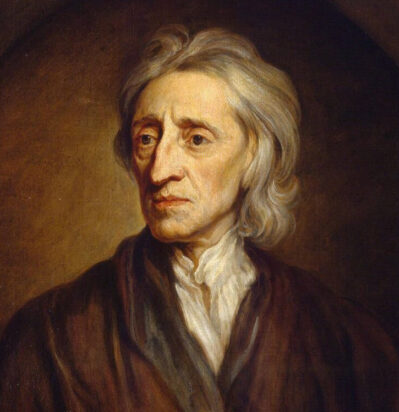
John Locke
生い立ち・生涯
生い立ちと初期の影響
ジョン・ロックは17世紀のイギリスで生まれ、その時代の政治的混乱と哲学的転換期に育ちました。
1632年に生まれ、彼の教育はオックスフォード大学で始まりました。
そこで古典的な教育を受けた彼は、当時の思想界で影響力のある人物たちとの交流を持ちました。
自然法と経験論
ロックの最も重要な貢献の一つは、自然法と経験論の概念の発展にあります。
彼は経験主義の立場を支持し、人間の知識の源泉を経験に求めました。
その思想は後の啓蒙時代に大きな影響を与えました。
『統治二論』と政治哲学
ロックの最も有名な著作の一つである『統治二論』は、政治哲学における画期的な作品です。
彼は君主主義に反対し、市民の権利や政府の正当性について議論しました。
彼の理論は、人々が政府によって統治されることを正当化する社会契約論の基礎を提供しました。
政治活動と影響
ロックは単なる理論家ではなく、実際の政治活動にも関与しました。
彼は名誉革命(1688年)の際に重要な役割を果たし、その後もイングランドの政治的発展に影響を与えました。
死後の影響
ロックの影響力は彼の死後も続きました。
彼の思想はアメリカ合衆国の建国に影響を与え、自由主義や民主主義の理念の発展に大きく寄与しました。
また、彼の経験論は科学や心理学の発展にも影響を与えました。
ジョン・ロックはその生涯を通じて、政治的、哲学的な革新を成し遂げ、現代社会においてもその影響は色褪せることがありません。
Life and Legacy
Early Life and Influences
John Locke was born in 17th-century England, a period marked by political turmoil and philosophical shifts. Born in 1632, he began his education at Oxford University, where he received a classical education and engaged with influential thinkers of the time.
Natural Law and Empiricism
One of Locke’s most significant contributions was the development of natural law and empiricism. He championed the empirical approach, asserting that human knowledge is derived from experience. This idea had a profound impact on the Enlightenment period.
“Two Treatises of Government” and Political Philosophy
Locke’s seminal work, “Two Treatises of Government,” revolutionized political philosophy. He opposed monarchism and discussed the rights of citizens and the legitimacy of government. His theories laid the groundwork for the social contract, justifying the governance of people by their consent.
Political Engagement and Influence
Locke was not just a theorist but also actively involved in politics. He played a crucial role during the Glorious Revolution of 1688 and continued to influence England’s political landscape afterward.
Posthumous Influence
Locke’s impact endured long after his death. His ideas significantly influenced the founding of the United States and contributed to the development of liberalism and democratic ideals. Additionally, his empiricism shaped the advancement of science and psychology. Throughout his life, John Locke achieved political and philosophical innovations, leaving a lasting legacy in modern society.
哲学・思想
ジョン・ロックの哲学・思想
自然法と経験論の提唱
ジョン・ロックは17世紀のイギリスにおいて、自然法と経験論の提唱者として知られています。
彼の哲学の基礎は、経験主義に根ざした認識論にあります。
彼は人間の知識の源泉を経験に求め、それによって人間の理解と行動が形成されると主張しました。
この立場は当時の合理主義とは対照的であり、後の啓蒙時代に大きな影響を与えました。
『統治二論』と政治哲学
ロックの最も著名な著作の一つである『統治二論』は、彼の政治哲学の中心的なテクストです。
この中で、ロックは政府の正当性について論じ、その根拠を社会契約論に置きました。
彼は市民の権利と政府の役割について考察し、君主主義に反対して民主主義的な政治体制を支持しました。
この著作は、その後の政治思想に大きな影響を与え、特にアメリカ合衆国の建国において重要な指針となりました。
知識と教育の重要性
ロックは知識と教育の重要性を強調しました。
彼は人間が経験から学ぶことで知識を獲得し、その知識が個々の自由と繁栄につながると信じていました。
そのため、教育の普及と自己啓発の重要性を訴え、広範な教育機会の提供を支持しました。
彼の考え方は、その後の教育政策や教育理論に影響を与えました。
宗教の自由と信仰の多元主義
ロックは宗教の自由と信仰の多元主義を支持しました。
彼は人々が自らの信仰を選択し、それに基づいて行動する権利を認めるべきだと主張しました。
彼は信仰の強制や宗教的不寛容を否定し、宗教的寛容の原則を提唱しました。
これは近代国家における宗教的自由の確立に寄与し、現代の多元的な社会の基盤となりました。
影響と遺産
ジョン・ロックの思想は彼の時代だけでなく、その後の世代にも大きな影響を与えました。
彼の経験主義と社会契約論は、政治哲学や倫理学の分野で広く引用され、その影響は現代にまで及んでいます。
彼の思想は民主主義、個人の権利、宗教の自由など、現代の価値観や政治体制の基盤となっています。
ジョン・ロックはその革新的な考え方と著作によって、近代思想史において不朽の功績を残しました。
Philosophy and Thought
John Locke’s Philosophy and Ideas
Advocate of Natural Law and Empiricism
John Locke is renowned in 17th-century England for advocating natural law and empiricism. His philosophy is grounded in epistemology, rooted in empiricism. Locke argued that human knowledge originates from experience, shaping our understanding and behavior. This stance contrasted with the rationalism of his time and significantly influenced the Enlightenment.
“Two Treatises of Government” and Political Philosophy
One of Locke’s most famous works, “Two Treatises of Government,” is central to his political philosophy. In this text, Locke discusses the legitimacy of government, basing it on the concept of the social contract. He examined citizens’ rights and the role of government, opposing monarchism and supporting democratic governance. This work greatly impacted subsequent political thought, particularly influencing the founding of the United States.
Importance of Knowledge and Education
Locke emphasized the importance of knowledge and education. He believed that individuals acquire knowledge through experience, leading to personal freedom and prosperity. Thus, he advocated for the spread of education and the importance of self-improvement, supporting the provision of widespread educational opportunities. His ideas influenced later educational policies and theories.
Religious Freedom and Pluralism
Locke supported religious freedom and faith pluralism. He argued that people should have the right to choose their faith and act according to it. Locke rejected the coercion of faith and religious intolerance, promoting the principle of religious tolerance. This contributed to establishing religious freedom in modern states, forming the foundation of today’s pluralistic societies.
Influence and Legacy
John Locke’s ideas had a profound impact not only in his time but also on subsequent generations. His empiricism and social contract theory are widely referenced in political philosophy and ethics, with their influence extending to the present day. Locke’s thought forms the basis of modern values and political systems, including democracy, individual rights, and religious freedom. His innovative ideas and writings have left an enduring legacy in the history of modern thought.
特徴
ジョン・ロックの特徴
経験主義の旗手
ジョン・ロックは経験主義の旗手として知られています。
彼は人間の知識や理解の源泉を経験に求め、それが個々の意識や行動を形作ると主張しました。
この立場は彼の時代においては革新的であり、後の啓蒙時代の思想に大きな影響を与えました。
自然法の擁護者
ロックは自然法の擁護者でもありました。
彼は人間の普遍的な権利や正義の原理を、自然法として規定しました。
その中でも特に有名なのが『統治二論』で、そこでは政府の正当性や市民の権利について論じられています。
ロックの自然法の理論は、後の政治思想に多大な影響を与えました。
社会契約論の提唱者
ロックは社会契約論の提唱者としても知られています。
彼は政府の正当性を市民の合意に基づく社会契約によって説明しました。
政府は市民の権利や利益を守るために存在し、その正当性は市民の同意に依存するというのがロックの主張です。
この考え方は民主主義や市民社会の理念を形成する上で重要な基盤となりました。
宗教的寛容の提唱
ロックは宗教的寛容の提唱者でもありました。
彼は人々が自らの信仰を選択し、それに基づいて行動する自由を持つべきだと考えました。
彼の宗教的寛容の原則は、宗教的不寛容や信仰の強制に反対する理念を表しています。
この考え方は現代の宗教的自由の概念にも深く影響を与えています。
政治的影響と遺産
ジョン・ロックの思想は単なる学術的議論にとどまらず、実際の政治活動にも影響を与えました。
彼は名誉革命(1688年)の際に政治的に活躍し、その後もイングランドの政治的発展に貢献しました。
また、彼の著作は後の世代にも影響を与え、特にアメリカ合衆国の建国において重要な指針となりました。
ジョン・ロックの思想は現代においても広く引用され、その影響は色褪せることがありません。
Characteristics
The Notable Traits of John Locke
Champion of Empiricism
John Locke is renowned as a champion of empiricism. He asserted that human knowledge and understanding stem from experience, which shapes individual consciousness and actions. This viewpoint was revolutionary in his era and profoundly influenced Enlightenment thought.
Advocate of Natural Law
Locke was also a staunch advocate of natural law. He defined universal human rights and principles of justice as natural laws. His seminal work, “Two Treatises of Government,” explores the legitimacy of government and the rights of citizens. Locke’s theories on natural law significantly impacted subsequent political thought.
Proponent of Social Contract Theory
Locke is well-known for his promotion of social contract theory. He explained the legitimacy of government through a social contract agreed upon by citizens. According to Locke, the government exists to protect the rights and interests of its citizens, and its legitimacy depends on their consent. This idea is foundational to the concepts of democracy and civil society.
Advocate of Religious Tolerance
Locke also championed religious tolerance. He believed people should have the freedom to choose and act according to their faith. His principles of religious tolerance oppose religious intolerance and the imposition of faith. This perspective has profoundly influenced modern concepts of religious freedom.
Political Influence and Legacy
John Locke’s ideas extended beyond academic debate to influence actual political activities. He played a significant role during the Glorious Revolution (1688) and contributed to England’s political development. His writings impacted future generations, particularly guiding the founding principles of the United States. Locke’s thoughts continue to be widely referenced today, and their influence remains undiminished.
エピソード
ジョン・ロックの逸話
オックスフォード大学時代の交友関係
ジョン・ロックは若き日、オックスフォード大学で学び、そこで当時の著名な学者や思想家たちと交流を深めました。
その中には、後に彼の考え方に影響を与えることとなる人々も含まれています。
特に、彼が友人となったフィロソフィアンズ・クラブ(哲学者のクラブ)のメンバーたちは、彼の知識と議論のスキルを磨く上で重要な役割を果たしました。
医学の学位取得と医療実践
ロックは当初、医学を専攻し、オックスフォード大学で医学の学位を取得しました。
その後、ロンドンで医療実践を行いましたが、彼の医師としてのキャリアは花開くことはありませんでした。
しかし、この期間に彼は医学的な観察と実践から多くの知識を得たと言われています。
また、この経験が後の彼の自然哲学や生理学に対する関心を深めることにもつながりました。
名誉革命と政治的活動
名誉革命(1688年)の際、ジョン・ロックは政治的な活動に積極的に関与しました。
彼はウィリアム3世の側近として行動し、革命の成功に貢献しました。
その後、ロックはウィリアム3世の政権でさまざまな公職に就き、政治的な影響力を行使しました。
この時期に彼は、政治哲学や社会契約論の理論を実践に生かす機会を得たと言われています。
ウィルトン・パークにおける隠遁生活
晩年のジョン・ロックは、友人であるウィリアム・ペンの家であるウィルトン・パークに身を隠し、隠遁生活を送りました。
この時期に彼は『統治二論』の執筆を行い、また自然哲学や宗教の問題についての研究を深めました。
彼の隠遁生活は、彼の思索と著作に集中するための貴重な時間となりました。
最後の日々と遺産
ジョン・ロックは1704年にウィルトン・パークで亡くなりました。
彼の死後、彼の著作や思想は広く知られ、多くの哲学者や政治家たちに影響を与えました。
彼の社会契約論や自然法の理論は、後の時代においても重要な政治的な指針となり、その遺産は現代にまで続いています。
ジョン・ロックはその生涯を通じて、知識の追求と自由のために活動し、その思想は今なお多くの人々にとって魅力的なものとなっています。
Episodes
Anecdotes about John Locke
Connections Made at Oxford University
In his youth, John Locke studied at Oxford University, where he mingled with prominent scholars and thinkers of the time. Among these were individuals who would later influence his own ideas. Particularly significant were the members of the Philosophical Club, with whom he forged friendships. This group played a crucial role in honing his knowledge and debating skills.
Earning a Medical Degree and Practicing Medicine
Initially, Locke pursued a degree in medicine at Oxford University and later practiced medicine in London. Though his medical career never truly flourished, this period provided him with substantial knowledge through medical observations and practice. This experience later deepened his interest in natural philosophy and physiology.
Active Role in the Glorious Revolution
During the Glorious Revolution of 1688, John Locke was actively involved in political activities. He acted as an advisor to William III and contributed to the revolution’s success. Subsequently, he held various public offices in William III’s government, wielding political influence. It is said that this period allowed him to apply his theories on political philosophy and social contract theory in practice.
Secluded Life at Wilton Park
In his later years, John Locke led a secluded life at Wilton Park, the home of his friend William Penn. During this time, he wrote “Two Treatises of Government” and delved deeply into studies on natural philosophy and religious issues. This period of seclusion provided him with valuable time to focus on his thoughts and writings.
Final Days and Legacy
John Locke passed away at Wilton Park in 1704. After his death, his works and ideas became widely known and influenced many philosophers and politicians. His theories on social contract and natural law continued to serve as important political guides in later eras, and his legacy persists to this day. Throughout his life, John Locke pursued knowledge and championed freedom, leaving behind a body of thought that remains compelling to many.
ジョン・ロック「英国‐経験論の父」 デカルト・ルソーらとの対話とは
バールーフ・デ・スピノザ(1632年11月24日 – 1677年2月21日)
Baruch Spinoza (November 24, 1632 – February 21, 1677)
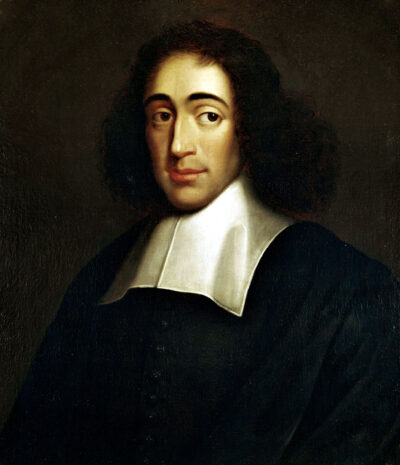
Baruch Spinoza
生い立ち・生涯
バールーフ・デ・スピノザの生い立ちと生涯
1. 若き日の背景
バールーフ・デ・スピノザは、1632年にオランダのアムステルダムで生まれました。
当時のオランダは、ヨーロッパの中でも商業と文化が栄える地域であり、宗教的寛容も特筆されます。
彼の家族はポルトガル系ユダヤ人で、スペインからの迫害を逃れてオランダに移住した人々でした。
2. 宗教的背景と影響
スピノザは、ユダヤ教の家庭で育ちましたが、幼少期には早くも聖書やユダヤ教の伝統に疑問を持ち始めます。
彼の父親が亡くなった後、14歳で学校を中退し、家業のレンズ製造業を手伝いました。
この頃から、スピノザは自らの思考を深め、独自の哲学的関心を育てていきます。
3. ラテン語学校と知識獲得
後にラテン語学校に通い、古代哲学や科学、近代哲学などを学びました。
特にルネサンス期の学問や哲学、自然科学の進展に興味を持ち、これらの知識が後の彼の思想形成に影響を与えることとなります。
4. 破門とその後
スピノザは、宗教的な見解や思想の違いから、ユダヤ教コミュニティから破門されました。
彼はその後、自由思想家として知られるようになり、特に自然主義や汎神論、倫理学の分野で重要な業績を残しました。
1677年に死去するまで、スピノザは自由思想と学問の追求に専念し続けました。
5. 思想の影響と遺産
スピノザの思想は、彼の存命中には広く受け入れられることはありませんでしたが、後に彼の業績は再評価され、啓蒙時代の哲学者や現代の思想家によって高く評価されました。
彼の主要な著作には、『エチカ』や『神学政治論』などがあり、これらの著作は近代哲学と倫理学の重要な基礎と見なされています。
Early Life and Biography
Baruch Spinoza’s Early Life and Biography
- Youthful Background Baruch Spinoza was born in 1632 in Amsterdam, the Netherlands, a region known for its flourishing commerce, culture, and notable religious tolerance in Europe. His family, of Portuguese Jewish descent, had migrated to the Netherlands to escape persecution in Spain.
- Religious Background and Influence Raised in a Jewish household, Spinoza began questioning the Bible and Jewish traditions from an early age. After his father’s death, he left school at 14 to help in the family’s lens-grinding business. It was during this period that Spinoza deepened his own thinking and nurtured a unique philosophical interest.
- Latin School and Acquisition of Knowledge He later attended a Latin school where he studied ancient philosophy, science, and early modern philosophy. Particularly intrigued by the Renaissance-era advancements in scholarship, philosophy, and natural sciences, these areas profoundly influenced his philosophical development.
- Excommunication and Subsequent Events Spinoza was excommunicated from the Jewish community due to his divergent religious views and unorthodox beliefs. Subsequently, he became known as a freethinker and made significant contributions in naturalism, pantheism, and ethics. Until his death in 1677, Spinoza dedicated himself to the pursuit of free thought and scholarly endeavors.
- Influence of His Thought and Legacy Spinoza’s ideas were not widely accepted during his lifetime but were later reevaluated and highly esteemed by Enlightenment philosophers and contemporary thinkers. His major works, including “Ethics” and “Theological-Political Treatise,” are considered fundamental to modern philosophy and ethics.
哲学・思想
バールーフ・デ・スピノザの哲学・思想
1. 神学政治論と自然主義の融合
バールーフ・デ・スピノザは、17世紀のオランダで活躍した哲学者であり、その思想は近代哲学の重要な基盤となりました。
彼の主要な著作の一つである『神学政治論』では、政治と宗教、倫理と神学の関係を探求しました。
スピノザは、自然主義的な視点から世界を理解しようとし、神を自然法に統合する試みを行いました。
彼は、神や宇宙に関する抽象的な概念ではなく、具体的な自然法則や物理的なプロセスを通して神を理解しようとしました。
2. 汎神論と人間の本性
スピノザの汎神論は、神が自然そのものであり、全ての存在が神の一部であるとする理論です。
彼は、神を自然の絶対的な原因として捉え、神は全ての存在を包括し、全ての現象を自然の法則に従って発展させる力であると考えました。
人間の本性も、スピノザにとっては自然の一部であり、理性と情動が組み合わさって形成されると考えました。
彼は、人間が理性を用いて自然の法則を理解し、情動をコントロールすることで、自由と幸福を実現できると信じました。
3. 永遠の真理と倫理
スピノザの哲学は、永遠の真理としての倫理を重視しました。
彼は、倫理学を自然法に基づいて構築し、人間の行動や道徳的判断を理性の観点から解析しました。
スピノザは、人間の欲望や情動が倫理的な行動を妨げる障害であると考え、これらを克服するためには理性の力を活用する必要があると主張しました。
彼の『エチカ』は、倫理学の体系的な論文であり、理性的な生き方や道徳的な善の探求について詳細に論じられています。
4. 政治と自由
スピノザは、政治においても自由の重要性を強調しました。
彼は、人々が自らの理性に従って政治を行うことで、自由で平和な社会を実現できると信じました。
また、宗教的な迫害や権威主義に反対し、宗教的寛容と政治的な自由を支持しました。
彼の政治思想は、個人の自由と共同体の秩序を調和させることを目指しており、その影響は啓蒙時代の政治思想に大きな影響を与えました。
5. 結びつけられた自然主義と倫理学
スピノザの哲学は、自然主義と倫理学が密接に結びついています。
彼は、自然の法則に従って世界が運行し、人間もその一部であると考えました。
この観点から、人間の理性と情動のバランスを保ちながら、倫理的な生き方を追求することが重要であると説きました。
スピノザの哲学は、自然と人間の関係、神と世界の関係、そして倫理的な生き方に関する新しい理解を提供し、現代の哲学や倫理学にも多大な影響を与えています。
スピノザの哲学は、自然と人間の関係、神と世界の関係、そして倫理的な生き方に関する新しい理解を提供し、現代の哲学や倫理学にも多大な影響を与えています。
Philosophy and Thought
Baruch Spinoza’s Philosophy and Thought
- Synthesis of Theological-Political Treatise and Naturalism Baruch Spinoza was a philosopher who thrived in 17th-century Netherlands, and his ideas became pivotal in modern philosophy. In his seminal work, Theological-Political Treatise, he explored the relationships between politics and religion, ethics and theology. Spinoza sought to understand the world from a naturalistic perspective, attempting to integrate God into natural law. Rather than abstract concepts about God or the universe, he aimed to comprehend God through concrete natural laws and physical processes.
- Pantheism and Human Nature Spinoza’s pantheism posits that God is nature itself, and all existence is part of God. He viewed God as the absolute cause of nature, encompassing all existence and guiding all phenomena according to natural laws. For Spinoza, human nature is also part of nature, formed by the combination of reason and emotions. He believed that by using reason to understand natural laws and controlling emotions, humans could achieve freedom and happiness.
- Eternal Truth and Ethics Spinoza’s philosophy emphasized ethics as eternal truths. Constructing ethics based on natural law, he analyzed human actions and moral judgments from a rational perspective. Spinoza considered human desires and emotions as obstacles to ethical behavior, advocating the use of reason to overcome them. His work Ethics is a systematic treatise discussing rational living and the pursuit of moral goodness in detail.
- Politics and Liberty Spinoza underscored the importance of liberty in politics. He believed that people could achieve a free and peaceful society by governing themselves according to their own reason. Moreover, he opposed religious persecution and authoritarianism, advocating religious tolerance and political freedom. His political thought aimed to harmonize individual liberty with communal order, significantly influencing Enlightenment-era political philosophy.
- Integrated Naturalism and Ethics Spinoza’s philosophy intricately links naturalism and ethics. He posited that the world operates according to natural laws, with humans being a part of this system. From this perspective, Spinoza argued for the importance of maintaining a balance between human reason and emotions while pursuing an ethical way of life. Spinoza’s philosophy offers new insights into the relationship between nature and humanity, God and the world, and ethical living, exerting profound influence on contemporary philosophy and ethics.
特徴
バールーフ・デ・スピノザの特徴
1. 独自の哲学体系の構築
バールーフ・デ・スピノザは、17世紀オランダの哲学者であり、彼の最も顕著な特徴は、独自の哲学体系を構築したことです。
彼は、数学や自然科学の方法を借りて、哲学的な問題にアプローチしました。
その結果、彼の哲学は、論理的で厳密な体系の中で展開されました。
2. 汎神論と自然主義
スピノザの最も重要な思想の一つは、汎神論です。
彼は神を自然そのものと見なし、全ての存在が神の一部であると考えました。
この観点から、彼の哲学は自然主義的な立場から展開され、自然の法則と因果関係に基づいて世界を解釈しました。
3. 自由意志の否定
スピノザは自由意志の概念を否定し、人間の行動や決定は自然の必然性に従うと主張しました。
彼によれば、人間の行為や欲求は必然的な原因によって生じ、自由意志は幻想に過ぎないと考えました。
この立場は、当時の伝統的な宗教や倫理観とは対立するものでした。
4. 政治への関心
スピノザは政治にも興味を持ち、その著作『政治論』では、人間の自由と平等を基盤とする政治的秩序を提唱しました。
彼は、宗教的な権威主義に反対し、政治の世界においても自由と寛容を重視しました。
5. 倫理学の重要性
スピノザは倫理学にも多くの関心を寄せ、その著作『エチカ』では、理性的な生き方と倫理的な善について探求しました。
彼は、理性と情動のバランスを保ちながら、個々の幸福と共同体の幸福を追求することを提唱しました。
6. 影響と批判
スピノザの思想は、当時の社会や哲学界に大きな衝撃を与えました。
彼の汎神論や自然主義的な立場は、宗教的な伝統や権威主義的な政治体制に対する挑戦として受け止められました。
一方で、彼の思想は強力な批判も浴び、その著作は出版禁止や破門の対象となることもありました。
バールーフ・デ・スピノザは、その独自の視点と論理的な洞察力によって、近代哲学の発展に大きな影響を与えました。
彼の哲学は、自然と人間の関係や倫理的な問題について新しい視点を提供し、現代の哲学においても重要なテーマとして扱われています。
Characteristics
Baruch Spinoza’s Characteristics
- Development of a Unique Philosophical System Baruch Spinoza, a philosopher from 17th-century Netherlands, is distinguished by his creation of a unique philosophical system. He approached philosophical questions borrowing methods from mathematics and natural sciences. As a result, his philosophy unfolded within a logical and rigorous framework.
- Pantheism and Naturalism One of Spinoza’s most significant ideas is pantheism. He regarded God as synonymous with nature itself, viewing all existence as part of God. From this standpoint, his philosophy evolved from a naturalistic perspective, interpreting the world based on natural laws and causality.
- Denial of Free Will Spinoza rejected the concept of free will, arguing that human actions and decisions follow the necessity of nature. According to him, human acts and desires arise from necessary causes, and free will is merely an illusion. This stance opposed traditional religious and ethical views of the time.
- Interest in Politics Spinoza also had a keen interest in politics. In his work Political Treatise, he advocated for a political order based on human freedom and equality. He opposed religious authoritarianism and emphasized freedom and tolerance in the political sphere as well.
- Importance of Ethics Spinoza devoted considerable attention to ethics. In his work Ethics, he explored rational living and the pursuit of moral goodness. He advocated for the pursuit of individual and communal happiness through maintaining a balance between reason and emotions.
- Influence and Criticism Spinoza’s ideas had a profound impact on society and the philosophical community of his time. His pantheism and naturalistic stance were seen as challenges to religious traditions and authoritarian political systems. However, his philosophy also faced significant criticism, leading to his works being banned and him being excommunicated.
Baruch Spinoza, through his unique perspective and logical insights, profoundly influenced the development of modern philosophy.
His philosophy continues to offer new insights into the relationship between nature and humanity, as well as addressing ethical issues, making it a significant theme in contemporary philosophy.
エピソード
バールーフ・デ・スピノザの逸話
1. 神秘的な出生
バールーフ・デ・スピノザは1632年にオランダのアムステルダムで生まれました。
彼の生い立ちには神秘的な要素があります。彼はセファルディム系ユダヤ人の家庭に生まれましたが、彼の父親はスペインからオランダに亡命してきたユダヤ人です。
スピノザ自身が生まれたときには、父親が既に亡くなっており、母親と祖父によって育てられました。
2. 異端の思想と迫害
スピノザは若い頃から学問に熱心であり、ラテン語やヘブライ語を習得しました。
しかし、彼の異端的な思想は当局の目に留まり、非常に厳しい迫害を受けました。
彼はトーラー解釈の異端者と見なされ、コルトレヒトのユダヤ教会から追放されました。
この出来事はスピノザの人生に大きな影響を与え、彼の思想の形成にも影響を与えました。
3. 『エチカ』の執筆と出版
スピノザの最も有名な著作である『エチカ』は、彼が生前には出版されませんでした。
彼はこの著作の執筆に長い時間を費やし、その中で自然の法則や人間の存在についての深い洞察を提供しました。
しかし、彼の思想は時代の風潮とは相容れず、『エチカ』は彼の死後、友人によって出版されました。
4. 書物の危険性と身の安全
スピノザの著作は当時の政治や宗教の権威に対する挑戦を含んでいたため、彼は自らの身の安全を脅かされることもありました。
彼はその著作によって出版禁止や破門の対象となり、しばしば迫害を受けました。
しかし、彼は自らの信念を曲げず、言論の自由と真理の追求を貫き通しました。
5. 死後の評価と影響
スピノザは生前は広く認められることはありませんでしたが、彼の死後、彼の思想は徐々に広まり、多くの哲学者や思想家に影響を与えました。
彼の汎神論や自然主義的な立場は、近代哲学の発展に大きな影響を与え、彼は「合理主義の父」として称賛されるようになりました。
バールーフ・デ・スピノザの生涯は、その思想と同様に、多くの謎と逸話に満ちています。
彼の異端的な思想と勇敢な姿勢は、現代の自由思想や個人の権利の擁護者にとっても、強力なインスピレーションとなっています。
Episodes
Anecdotes of Baruch Spinoza
- Mysterious Birth Baruch Spinoza was born in 1632 in Amsterdam, Netherlands. His upbringing carries a mysterious element. Born into a Sephardic Jewish family, his father was a Jewish immigrant from Spain to the Netherlands. Spinoza’s father had already passed away by the time of his birth, and he was raised by his mother and grandfather.
- Unorthodox Thought and Persecution From a young age, Spinoza was enthusiastic about learning, mastering Latin and Hebrew. However, his unorthodox thoughts drew harsh persecution from authorities. Branded as a heretic for his interpretations of the Torah, he was expelled from the Jewish community of Amsterdam. This event profoundly shaped Spinoza’s life and influenced the formation of his philosophical ideas.
- Writing and Publishing “Ethics” Spinoza’s most famous work, Ethics, was not published during his lifetime. He dedicated a significant amount of time to writing this work, offering deep insights into natural laws and human existence. However, his ideas clashed with the prevailing sentiments of the time, and Ethics was published posthumously by his friends.
- The Danger of His Writings and Personal Safety Due to the challenges his writings posed to political and religious authorities of his time, Spinoza’s personal safety was often threatened. His works led to bans and excommunication, and he frequently faced persecution. Nevertheless, he remained steadfast in his beliefs, advocating for freedom of speech and the pursuit of truth.
- Posthumous Evaluation and Influence Spinoza was not widely recognized during his lifetime, but after his death, his ideas gradually gained prominence and influenced many philosophers and thinkers. His pantheism and naturalistic stance significantly impacted the development of modern philosophy, earning him the title “the father of rationalism.” Baruch Spinoza’s life is filled with mysteries and anecdotes, much like his philosophical ideas. His unorthodox thinking and courageous stance continue to inspire advocates of modern free thought and individual rights.
サー・アイザック・ニュートン(1642年12月25日 – 1727年3月20日)
Sir Isaac Newton (December 25, 1642 – March 20, 1727)
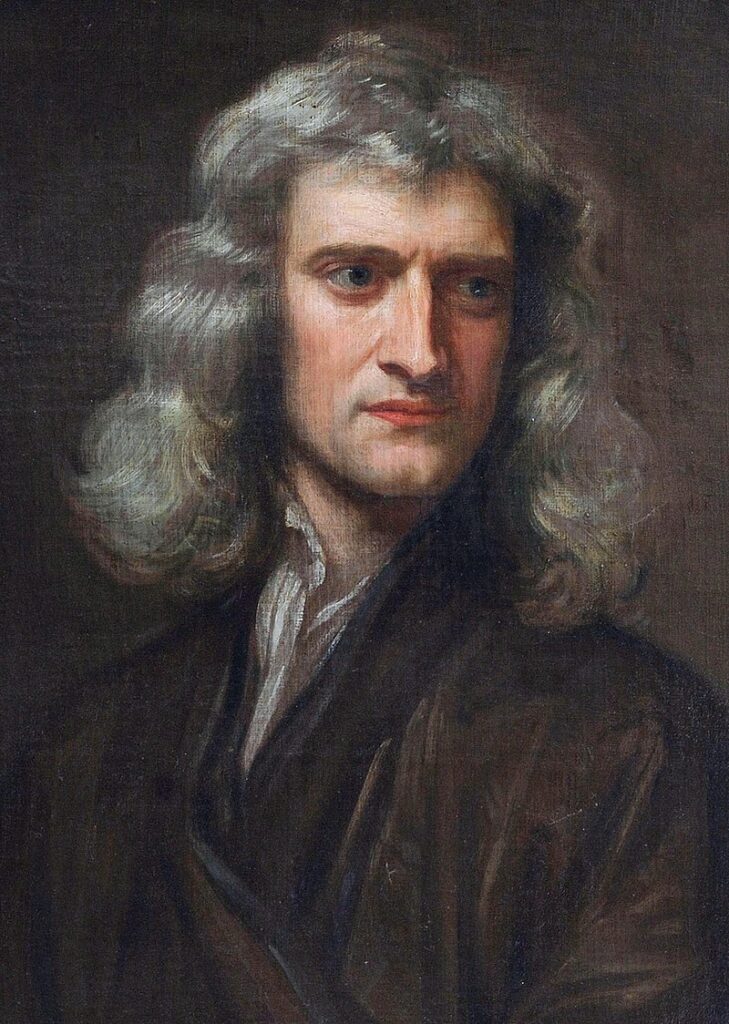
Sir Isaac Newton
生い立ち・生涯
サー・アイザック・ニュートンの生い立ち・生涯
1. 幼少期からの興味
サー・アイザック・ニュートンは1642年にイギリスのリンカンシャーで生まれました。
幼少期から物理学や数学に興味を持ち、自宅の近くにある田園地帯で観察や実験を行うことが多かったとされています。
彼の興味は特に天文学に向かい、太陽や星の運動に関する独自の観察を行いました。
2. ケンブリッジ大学での学生時代
1661年、ニュートンはケンブリッジ大学トリニティ・カレッジに入学しました。
ここで彼は数学と自然哲学(当時の物理学)に熱心に取り組み、特にアリスティド・フェルナンデスの作品に影響を受けました。
彼は新しい数学的手法を開発し、微積分学や幾何学の基礎を築きました。
3. 重力の法則の発見
1665年、ニュートンはプラーガでペストが流行し、ケンブリッジ大学が閉鎖された際に、自宅に引きこもって研究に没頭しました。
この時期に彼は万有引力の法則を発見し、それを地球上での物体の運動や天体の運動の解明に応用しました。
この発見は後に彼の最も重要な業績の一つとなりました。
4. 理論の確立と公表
ニュートンは自らの研究成果をまとめ、1687年に『自然哲学の数学的原理』(プリンキピア)として出版しました。
この著作には、万有引力の法則や運動の法則など、多くの革新的な理論が含まれています。
プリンキピアの出版は科学史上の画期的な出来事であり、ニュートンの名声を確立しました。
5. その後の人生と功績
ニュートンはその後も数学や天文学の研究を続け、1703年に王立協会の会長に就任しました。
彼の業績は数々の栄誉をもたらし、1705年にはナイトに叙せられ「サー」の称号を得ました。
彼の死後も、ニュートンの業績は世界中の科学者に影響を与え、彼は近代科学の父として永遠に記憶されることとなりました。
サー・アイザック・ニュートンの生涯は、卓越した知性と熱意に満ちた物語です。
彼の業績は科学史上において不朽のものとされ、その功績は今日まで数々の分野に影響を与え続けています。
Early Life and Biography
Sir Isaac Newton’s Early Life and Biography
- Childhood Curiosity
Sir Isaac Newton was born in 1642 in Lincolnshire, England.
From a young age, he showed a keen interest in physics and mathematics, often conducting observations and experiments in the rural countryside near his home.
His fascination particularly turned towards astronomy, where he made unique observations about the movements of the sun and stars.
- Student Years at Cambridge University
In 1661, Newton enrolled at Trinity College, Cambridge University.
Here, he delved passionately into mathematics and natural philosophy (early physics), heavily influenced by works of authors like Aristides Fernandes.
He developed new mathematical methods, laying the foundations for calculus and geometry.
- Discovery of the Law of Gravity
In 1665, when Cambridge University closed due to the plague outbreak in London, Newton secluded himself at home and immersed in research.
During this period, he discovered the law of universal gravitation, applying it to explain the motion of objects on Earth and celestial bodies.
This discovery became one of his most significant achievements.
- Establishment and Publication of Theories
Newton consolidated his research findings and published them in 1687 as “Mathematical Principles of Natural Philosophy” (Principia).
This work included revolutionary theories such as the law of universal gravitation and laws of motion.
The publication of Principia was a landmark event in the history of science, establishing Newton’s fame.
- Later Life and Achievements
Newton continued his studies in mathematics and astronomy, becoming the President of the Royal Society in 1703.
His achievements earned him numerous honors, including knighthood in 1705, becoming Sir Isaac Newton.
Even after his death, Newton’s contributions continued to influence scientists worldwide, solidifying his legacy as the father of modern science.
Sir Isaac Newton’s life is a tale of exceptional intellect and passion.
His contributions are immortalized in the history of science, continuing to impact various fields to this day.
哲学・思想
サー・アイザック・ニュートンの哲学・思想
1. 理論の確立と天文学への貢献
サー・アイザック・ニュートンは、17世紀末から18世紀初頭にかけて活躍した、数学者、物理学者、そして天文学者でした。
彼の最も著名な業績は、万有引力の法則を含む重力の理論の確立です。
ニュートンは、地球上での物体の運動から天体の運動まで、万有引力の法則を適用し、その法則が宇宙全体の運動を支配することを示しました。
この業績により、ニュートンは近代物理学の基礎を築きました。
2. 経験論としての自然観
ニュートンの哲学的立場は、経験論の伝統に根ざしています。
彼は観察と実験を重視し、その結果に基づいて理論を構築しました。
彼の著作『自然哲学の数学的原理』(プリンキピア)において、彼は数学と実験によって自然現象を解明する方法を提示しました。
この方法論は、後の科学の発展に大きな影響を与えました。
3. 汎化と抽象化の能力
ニュートンは、具体的な観察や実験から一般的な原理を抽出する能力に優れていました。
彼の重力の法則は、地球上の物体だけでなく、天体の運動にも適用される普遍的な法則として理解されました。
このような抽象化の能力は、彼の物理学的理論が広範囲にわたって適用される理由の一つです。
4. 神学的な観点からの宇宙観
ニュートンは科学者としてだけでなく、神学者としても活動しました。
彼は宇宙の秩序や法則を神の存在と結びつけ、自然現象の背後にある神の意図を考えました。
彼の著作『神学的な言葉』では、自然の秩序は神の創造によるものであり、神の摂理に従って運行していると主張しています。
5. 彼の哲学の遺産
ニュートンの哲学的遺産は、その影響力の大きさから想像を絶するものです。
彼の重力の法則や運動の法則は、科学的方法論の基礎を築き、科学の進歩に大きな影響を与えました。
また、彼の神学的視点は、自然の秩序と神の存在の関係についての議論を呼び起こしました。
ニュートンの思想は、科学と宗教の接点における重要な議論の一翼を担っています。
Philosophy and Thought
Sir Isaac Newton’s Philosophy and Thought
- Establishment of Theories and Contributions to Astronomy
Sir Isaac Newton, a prominent figure in the late 17th to early 18th century, was a mathematician, physicist, and astronomer.
His most notable achievement was the establishment of the theory of gravity, including the law of universal gravitation.
Newton applied the law of universal gravitation from the motion of objects on Earth to the movements of celestial bodies, demonstrating how this law governs the entire universe’s motion.
This accomplishment laid the foundation for modern physics.
- Empirical View of Nature
Newton’s philosophical stance was rooted in the tradition of empiricism.
He emphasized observation and experimentation, constructing theories based on their results.
In his work “Mathematical Principles of Natural Philosophy” (Principia), Newton outlined methods to elucidate natural phenomena through mathematics and experimentation.
This methodology profoundly influenced the development of science.
- Ability in Generalization and Abstraction
Newton excelled in extracting general principles from specific observations and experiments.
His law of gravity was understood as a universal principle applicable not only to objects on Earth but also to celestial motions.
This capacity for abstraction is a key reason why his physical theories have such broad applicability.
- Cosmology from a Theological Perspective
Newton was not only a scientist but also a theologian.
He linked the order and laws of the universe to the existence of God, contemplating the divine intention behind natural phenomena.
In his work “Theological Philosophy,” he argued that the order of nature is created by God and operates according to divine providence.
- His Philosophical Legacy
Newton’s philosophical legacy is monumental due to its profound impact.
His laws of gravity and motion established the foundation of scientific methodology, significantly influencing the progress of science.
Furthermore, his theological perspective sparked discussions about the relationship between the order of nature and the existence of God.
Newton’s thoughts continue to be a pivotal part of significant debates at the intersection of science and religion.
特徴
サー・アイザック・ニュートンの特徴
1. 多岐にわたる才能
サー・アイザック・ニュートンは、17世紀から18世紀初頭にかけて活躍した多才な学者でした。
彼は物理学者、数学者、天文学者、そして神学者としての側面を持ち、その業績は科学史上において不朽のものとされています。
2. 万有引力の法則
ニュートンの最も著名な業績は、万有引力の法則の発見です。
1666年にリンゴが地面に落ちる様子を観察し、地球の引力がその運動を支配しているという考えに至りました。
その後、1687年に『自然哲学の数学的原理』を発表し、万有引力の法則を含む新しい物理学の体系を確立しました。
3. 微積分学の創始
ニュートンは微積分学の基本的な考え方を独自に発展させ、微分法と積分法を体系化しました。
これにより、物理学や数学の問題を解決するための強力な数学的手法を提供しました。
彼の著作『微積分法の算術』は、その分野の重要な基礎文献の一つとして広く認知されています。
4. 光の分散と干渉
ニュートンは光の性質に関する研究も行いました。
彼は光をプリズムに通すことで分光効果を観察し、さらに光の干渉についても研究しました。
これらの実験と観察により、彼は光が様々な波長の成分に分解されることを発見しました。
5. 科学と宗教の関係
ニュートンは科学的な研究だけでなく、神学的な興味も持っていました。
彼は自然の秩序や法則を神の存在と関連付け、自然の摂理を神の創造として理解しようとしました。
そのため、彼の業績は科学と宗教の関係においても重要なものと見なされています。
6. 彼の遺産
ニュートンの業績は、科学的方法論の確立や物理学の基礎の築き上げという面だけでなく、数学や天文学、そして哲学における貢献も含まれます。
彼の万有引力の法則や微積分法の発見は、科学史上における最も重要な出来事の一つとされています。
Characteristics
Sir Isaac Newton’s Characteristics
- Diverse Talents
Sir Isaac Newton was a versatile scholar who flourished from the late 17th to early 18th century.
He was known for his roles as a physicist, mathematician, astronomer, and theologian, with his achievements considered timeless in the history of science.
- Law of Universal Gravitation
Newton’s most renowned achievement was the discovery of the law of universal gravitation.
In 1666, while observing an apple falling to the ground, he conceived the idea that Earth’s gravity governs its motion.
Subsequently, in 1687, he published the “Mathematical Principles of Natural Philosophy,” establishing a new system of physics that included the law of universal gravitation.
- Founding of Calculus
Newton independently developed the fundamental concepts of calculus, systematizing differential and integral calculus.
This provided a powerful mathematical tool for solving problems in physics and mathematics.
His work “The Method of Fluxions” is widely recognized as a foundational text in the field.
- Dispersion and Interference of Light
Newton also conducted research on the properties of light.
By passing light through a prism, he observed the phenomenon of spectrum dispersion and further studied the interference of light.
Through these experiments and observations, he discovered that light can be decomposed into components of various wavelengths.
- Relationship Between Science and Religion
Newton had theological interests alongside his scientific research.
He linked the order and laws of nature to the existence of God, seeking to understand the divine intention behind the providence of nature.
Therefore, his contributions are considered significant in the discourse on the relationship between science and religion.
- His Legacy
Newton’s legacy encompasses not only the establishment of scientific methodology and the foundation of physics but also his contributions to mathematics, astronomy, and philosophy.
His discoveries of the law of universal gravitation and calculus are regarded as among the most pivotal events in the history of science.
エピソード
サー・アイザック・ニュートンの逸話
リンゴの落下に至る物理学の発見
サー・アイザック・ニュートンの名前を聞くと、多くの人々が彼の有名なリンゴの逸話を思い出すでしょう。
1666年のある日、ニュートンが家の庭でリンゴを見ていると、突然、リンゴが木から落ちる様子に気付きました。
このシンプルな出来事が、彼の物理学的発見のきっかけとなったのです。
リンゴの落下による引力の発見
リンゴが地面に落ちることを目撃したことで、ニュートンは物体が地球に引かれる力があるという考えに至りました。
この力こそが、後に彼が「万有引力」と名付ける法則の発見につながりました。
リンゴの落下が、ニュートンにとって物理学の新しい世界を開くきっかけとなったのです。
過去の伝承と真実の物理学
逸話には、リンゴがニュートンの頭上を通り過ぎたというロマンチックな描写も含まれていますが、実際にはそうではありません。
ニュートン自身がこの出来事を語ったわけではなく、後世の伝承によって物語が作られたものです。
しかし、この逸話は彼の物理学的発見を象徴するものとして、時代を超えて語り継がれています。
科学の発展に対する影響
ニュートンのリンゴの逸話は、科学史上において重要な意味を持ちます。
この出来事がなければ、彼が万有引力の法則を発見することはなかったかもしれません。
リンゴの落下による引力の発見は、物理学や天文学の基礎を確立し、科学の発展に大きな影響を与えました。
人間らしさを感じさせる逸話
リンゴの逸話は、科学者としてのニュートンだけでなく、彼の人間性や探求心にも光を当てています。
リンゴが地面に落ちる様子を見て、彼はなぜそれが起こるのかを理解しようとしました。
この逸話は、科学者が日常の出来事から着想を得て偉大な発見をする可能性を示しています。
Episode
Anecdotes of Sir Isaac Newton
The Discovery of Physics through the Falling Apple
When you hear the name Sir Isaac Newton, many people recall his famous anecdote involving an apple.
One day in 1666, while Newton was in his garden, he noticed an apple falling from a tree.
This simple event sparked his journey into the realm of physics.
The Discovery of Gravity from the Falling Apple
Witnessing the apple fall to the ground led Newton to conceive the idea of a force pulling objects towards the Earth.
This force eventually led to his discovery of the law he later named “universal gravitation.”
The falling apple opened up a new world of physics for Newton.
Legend versus Scientific Truth
The anecdote includes romanticized depictions of the apple passing over Newton’s head, but this is not historically accurate.
Newton himself did not recount this event; rather, it was embellished over time.
However, this anecdote symbolizes his scientific discoveries and continues to be retold across generations.
Impact on the Advancement of Science
Newton’s apple anecdote holds significant meaning in the history of science.
Without this event, he might never have discovered the law of universal gravitation.
The discovery of gravity from the falling apple established the foundations of physics and astronomy, profoundly influencing the progress of science.
A Humanizing Anecdote
The story of the apple not only highlights Newton as a scientist but also sheds light on his humanity and curiosity.
Upon seeing the apple fall, he sought to understand why it happened.
This anecdote illustrates the potential for scientists to derive inspiration from everyday events to make great discoveries.
ゴットフリート・ヴィルヘルム・ライプニッツ(1646年7月1日 – 1716年11月14日)
Gottfried Wilhelm Leibniz (July 1, 1646 – November 14, 1716)
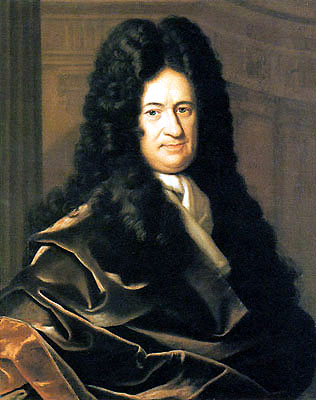
Gottfried Wilhelm Leibniz
生い立ち・生涯
ゴットフリート・ヴィルヘルム・ライプニッツの生い立ちと生涯
早期の才能と学問への情熱
ゴットフリート・ヴィルヘルム・ライプニッツは、1646年に現在のドイツに生まれました。
彼は幼少期から非凡な才能を示し、幼い頃から数学や言語学に興味を持ちました。
父親から初等教育を受けた後、ヴィルヘルムシューレで学び、14歳でライプニッツはライプツィヒ大学に入学しました。
学問との対話から新たなアイデアへ
大学で学ぶうちに、ライプニッツは哲学や数学に魅了されました。
彼はヴォルフィウスやエクカルトの哲学に触れ、自らの思考を深めました。
特に、数学においては微積分学や解析学に革新的なアイデアを持ち込み、彼独自の記法や概念を開発しました。
外交官としての活動
ライプニッツは一時期外交官としても活躍しました。
彼はハノーファー選帝侯領の宰相であるルドルフ・アウグストに仕え、ヨーロッパ各地を訪れました。
この期間中、彼はフランスやイギリスなどで多くの有名な哲学者や科学者と交流し、知識を深めました。
晩年の哲学と思想の展開
晩年には、ライプニッツは特に形而上学や哲学に集中しました。
彼は「最良の世界論」を提唱し、神が創造したこの世界が最も完全で調和のとれたものであると信じました。
また、彼はモナド論を発展させ、全体性と個別性の関係を探求しました。
死と遺産
ライプニッツは1716年に没しましたが、彼の思想はその後の哲学や数学に大きな影響を与えました。
彼の業績は多岐にわたり、彼の考え方やアイデアは今日でも研究され、尊重されています。
彼は、数学、哲学、論理学の分野で傑出した業績を残し、西洋哲学の歴史において不朽の名声を築きました。
Early Life and Career
Gottfried Wilhelm Leibniz: His Early Years and Life
- Early Talent and Academic Passion Gottfried Wilhelm Leibniz was born in 1646 in what is now Germany. Showing remarkable talent from a young age, he developed an interest in mathematics and linguistics early on. After receiving elementary education from his father, Leibniz attended the Wilhelmschule and enrolled at Leipzig University at the age of 14.
- Exploration of New Ideas through Academic Discourse During his university years, Leibniz became captivated by philosophy and mathematics. He engaged with the philosophies of Wolffius and Descartes, deepening his own thoughts. Particularly in mathematics, he introduced innovative ideas in calculus and analysis, developing his own notation and concepts.
- Diplomatic Endeavors Leibniz also served as a diplomat for a time. He worked under Rudolf August, the Elector of Hanover, and traveled extensively throughout Europe. During this period, he interacted with many renowned philosophers and scientists in France and England, further expanding his knowledge.
- Later Philosophical and Theoretical Developments In his later years, Leibniz focused particularly on metaphysics and philosophy. He advocated for the “Best of All Possible Worlds,” believing that this world, created by God, is the most complete and harmonious. Additionally, he developed the theory of monads, exploring the relationship between unity and individuality.
- Legacy and Death Leibniz passed away in 1716, but his ideas continued to profoundly influence subsequent philosophy and mathematics. His contributions spanned diverse fields, and his thoughts and ideas are still studied and respected today. He left a lasting legacy in mathematics, philosophy, and logic, establishing an enduring reputation in the history of Western philosophy.
哲学・思想
ゴットフリート・ヴィルヘルム・ライプニッツの哲学・思想
形而上学とモナド論
ゴットフリート・ヴィルヘルム・ライプニッツは、17世紀から18世紀にかけて活躍した哲学者であり、彼の思想は数学や自然科学、形而上学などに大きな影響を与えました。
彼の最も重要な哲学的業績の一つは「モナド論」です。
モナドとは、無数に存在する独自の実体であり、それぞれが内部に全宇宙を反映しているというライプニッツの考えを表しています。
彼はモナドが物質的な接触を持たず、ただ互いに影響し合うと考えました。
これにより、モナドは不可分であり、内部の変化は外部からの影響によるものではなく、内部から自発的に生じるとされました。
最良の世界論
ライプニッツはまた、「最良の世界論」において、この世界は神によって最も完璧かつ調和の取れたものとして創造されたと主張しました。
彼はこの世界が神の完全性と智慧を反映していると考え、世界の中にはすべてが最適な秩序で配置されていると信じました。
しかし、人間の理解が限られているために、時には神の計画が理解できないこともあると述べました。
普遍論理学と数学
ライプニッツはまた、普遍論理学や形式論理学の分野でも重要な業績を残しました。
彼は二元論理学の代わりに多元論理学を提唱し、論理的真理や関係の理論についての独自の理論を展開しました。
また、微積分学の発展にも貢献し、微分積分学の基礎を築きました。
彼の微分積分学の記法は、後にライプニッツの記法として知られるようになりました。
影響と遺産
ライプニッツの思想は、その後の哲学や数学、科学に大きな影響を与えました。
彼のモナド論や最良の世界論は、後の哲学者や思想家に多大な影響を与えました。
また、彼の数学的業績は、微積分学や論理学の分野で重要な基盤を提供しました。
彼の業績は多岐にわたりますが、彼は現代の数学、哲学、科学の基盤を築く上で重要な役割を果たしました。
Philosophy
Gottfried Wilhelm Leibniz’s Philosophy and Thought
- Metaphysics and Monadology Gottfried Wilhelm Leibniz, a philosopher active from the 17th to the 18th century, profoundly influenced mathematics, natural sciences, and metaphysics. One of his most significant philosophical achievements is the “Monadology.” Monads, according to Leibniz, are individual entities that exist in infinite numbers, each reflecting the entire universe within itself. He posited that monads do not have material interaction but rather mutually influence each other. As indivisible entities, monads undergo internal changes spontaneously, independent of external influences.
- Best of All Possible Worlds Leibniz also proposed the “Best of All Possible Worlds” theory, asserting that this world was created by God as the most perfect and harmonious. He believed this world reflects God’s perfection and wisdom, where everything is optimally ordered. However, due to human limitations in understanding, he acknowledged that sometimes God’s plan may seem incomprehensible.
- Universal Logic and Mathematics Leibniz made significant contributions to universal logic and formal logic. He advocated for pluralism in logic rather than dualism, developing his own theories on logical truths and relational theory. Additionally, he contributed to the development of calculus, laying the foundation for differential and integral calculus. His notation for calculus later became known as “Leibniz’s notation.”
- Influence and Legacy Leibniz’s ideas had a profound impact on subsequent philosophers, thinkers, and scientists. His Monadology and Best of All Possible Worlds theories greatly influenced later philosophers and thinkers. Moreover, his mathematical achievements provided a crucial foundation in the fields of calculus and logic. His contributions spanned various disciplines, playing a crucial role in shaping the foundation of modern mathematics, philosophy, and science.
特徴
ゴットフリート・ヴィルヘルム・ライプニッツの特徴
普遍論理学の確立
ゴットフリート・ヴィルヘルム・ライプニッツは、17世紀から18世紀初頭にかけて活躍した哲学者、数学者、そして科学者でした。
彼の最も顕著な特徴の一つは、普遍論理学の確立における功績です。
彼は論理学の分野で多大な貢献をし、二元論理学に対する批判的見解を提示しました。
その代わりに、多元論理学を提唱し、論理学的真理や関係の理論についての革新的なアイデアを提案しました。
彼の論理学的業績は、後の時代の哲学と数学の発展に大きな影響を与えました。
形而上学的な思考と最良の世界論
ライプニッツはまた、形而上学的な思考においても特筆すべき存在でした。
彼の最良の世界論は、神によって創造された世界が最も完璧なものであるという考えを基盤としています。
彼はこの世界が神の完全性を反映しており、全体としての調和と秩序があると信じました。
この考え方は、後の哲学や宗教の思想にも影響を与えました。
モナド論と個体論
モナド論は、ライプニッツの哲学の中でも特に重要な概念の一つです。
彼はモナドと呼ばれる無数の実体が存在し、それぞれが自己完結的であり、内部に全宇宙を反映していると考えました。
彼はこれを、物質的な接触を持たない独立した存在として定義しました。
この考え方は彼の個体論の一部であり、個々の存在が不可分であり、内部からのみ変化が生じるという彼の理論を示しています。
数学的業績と微積分学
ライプニッツは数学の分野でも非常に重要な業績を残しました。
彼は微積分学の創始者の一人と見なされており、微分積分学の基礎を築きました。
また、微積分学の記法においてライプニッツの記法が広く使用されるようになりました。
彼の数学的業績は、物理学や工学などの科学分野にも大きな影響を与えました。
影響と遺産
ライプニッツの思想と業績は、その後の哲学や数学、科学に深い影響を与えました。
彼の論理学の発展や数学の進歩は、近代の科学的方法論や知識体系の形成に大きな影響を与えました。
彼の形而上学的な考え方や最良の世界論は、後の哲学や宗教の思想にも大きな影響を与えました。
ライプニッツの業績は、現代の知識体系の形成において重要な役割を果たしています。
Distinctive Features
Gottfried Wilhelm Leibniz’s Distinctive Contributions
- Establishment of Universal Logic Gottfried Wilhelm Leibniz, a philosopher, mathematician, and scientist active from the late 17th to early 18th centuries, is renowned for his significant contributions, notably in the establishment of universal logic. He made profound advancements in the field of logic, presenting critical views against dualistic logic. Instead, he advocated for pluralistic logic, introducing innovative ideas regarding logical truth and relational theory. His logical achievements greatly influenced the development of philosophy and mathematics in subsequent eras.
- Metaphysical Thought and the Best of All Possible Worlds Leibniz was also a notable figure in metaphysical thought. His theory of the “Best of All Possible Worlds” posits that the world created by God is the most perfect and harmonious. He believed this world reflects God’s perfection, with everything arranged in optimal order and harmony. This perspective had a profound impact on later philosophical and religious thought.
- Monadology and Individualism Monadology stands as one of the pivotal concepts in Leibniz’s philosophy. He conceived monads as countless entities, each self-contained and reflecting the entire universe internally. Defining them as independent entities without material interaction, he argued that each monad is indivisible and undergoes changes solely from within. This theory is integral to his doctrine of individualism, emphasizing that each existence is indivisible and internally driven.
- Mathematical Achievements and Calculus Leibniz made significant contributions in mathematics, particularly as one of the pioneers of calculus. He laid the groundwork for differential and integral calculus, and his notation for calculus, known as “Leibniz’s notation,” became widely adopted. His mathematical achievements extended their influence into fields such as physics and engineering.
- Impact and Legacy Leibniz’s ideas and achievements profoundly influenced subsequent developments in philosophy, mathematics, and science. His advancements in logic and mathematics contributed significantly to the formation of modern scientific methodologies and knowledge systems. His metaphysical ideas and the theory of the Best of All Possible Worlds continue to shape philosophical and religious thought. Leibniz’s contributions play a crucial role in shaping our contemporary understanding across various knowledge domains.
エピソード
ゴットフリート・ヴィルヘルム・ライプニッツの逸話
1. 万物の計算機
ライプニッツは非常に知的で、幼少期から驚異的な計算能力を持っていました。
ある日、彼が幼い頃に遊んでいると、父親が宝石店を訪れました。
店主が数学の難問に取り組んでいると、ライプニッツはその問題を見て、「答えは1584」と言いました。
驚いた店主がライプニッツの答えを検証すると、正確であることが判明しました。
これは彼が驚異的な計算能力を持っていた最初の逸話の一つです。
2. 物理学者としての野心
ライプニッツは哲学者や数学者だけでなく、物理学者としても活動しました。
彼は、当時最先端の科学的問題に取り組むことを夢見ていました。
ある時、彼は宇宙空間での航行を可能にする「宙船」の設計を考案しました。
この宙船は空気の中で推進力を発揮し、理論的には宇宙空間でも機能するとされました。
彼は宙船の設計図をいくつか残しましたが、実際に建造されたかどうかは不明です。
3. 知識の図書館
ライプニッツは、人類の知識を包括的に収集し、整理するための大規模な計画を持っていました。
彼は「普遍図書館」と呼ばれるプロジェクトを提唱し、この図書館には人類が持つすべての知識が収蔵されると考えていました。
このプロジェクトのために、彼は膨大な数の書籍や論文を収集し、様々な学問分野の知識を体系化しようとしました。
しかし、この野心的な計画は彼の死後に実現されることはありませんでした。
4. カール大帝との対話
ライプニッツは多くの著名人と交流しましたが、その中でも特筆すべき人物の一人がカール大帝でした。
彼はカール大帝の再来と考え、彼の理想的な統治について熱心に議論しました。
ライプニッツはカール大帝との対話の中で、理性に基づく統治の必要性や普遍的な平和の構想について議論しました。
彼はこの対話を通じて、理想的な政治体制や社会秩序の構築について深く考える機会を得ました。
ライプニッツの逸話は彼の卓越した知性や野心、そして人間性を示しています。彼の業績と同様に、これらの逸話も彼の人生と思想の興味深い側面を浮かび上がらせています。
Episodes
Anecdotes of Gottfried Wilhelm Leibniz
- The Universal Calculator Leibniz was exceptionally intelligent and demonstrated astounding calculation abilities from a young age. One day, while he was playing as a child, his father visited a jeweler’s shop. The shop owner was grappling with a mathematical problem when Leibniz glanced at it and confidently declared, “The answer is 1584.” Astonished, the shop owner verified Leibniz’s answer and found it to be correct. This incident marks one of the earliest anecdotes showcasing his remarkable computational skills.
- Ambitions as a Physicist Leibniz not only excelled as a philosopher and mathematician but also pursued ambitions as a physicist. He dreamed of tackling cutting-edge scientific challenges of his time. At one point, he devised plans for an “air-ship” that could navigate in outer space. Theoretically, this air-ship would generate propulsion within the atmosphere and function in outer space as well. Although he left behind several designs for this air-ship, it remains unclear if any were ever constructed.
- The Library of Knowledge Leibniz harbored a grand vision to comprehensively collect and organize all human knowledge. He proposed a project known as the “Universal Library,” envisioned to house every piece of knowledge humanity possessed. For this ambitious endeavor, he collected a vast number of books and papers, attempting to systematize knowledge across various fields of study. However, this ambitious project never came to fruition during his lifetime.
- Dialogue with Charlemagne Leibniz engaged with numerous prominent figures, among whom Charlemagne stands out prominently. He envisioned Charlemagne as a model ruler and passionately discussed ideal governance with him. In their dialogues, Leibniz deliberated on the necessity of governance based on reason and conceived notions of universal peace. Through these conversations, he explored deeply the construction of ideal political systems and social orders. Leibniz’s anecdotes not only highlight his exceptional intellect and ambitions but also reveal intriguing aspects of his life and philosophy.


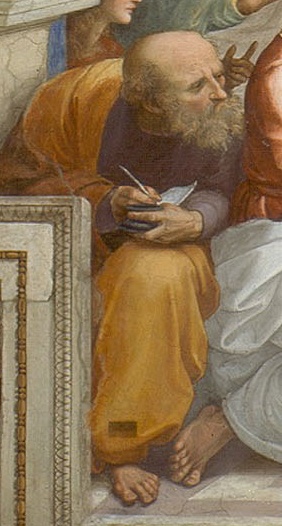
コメント